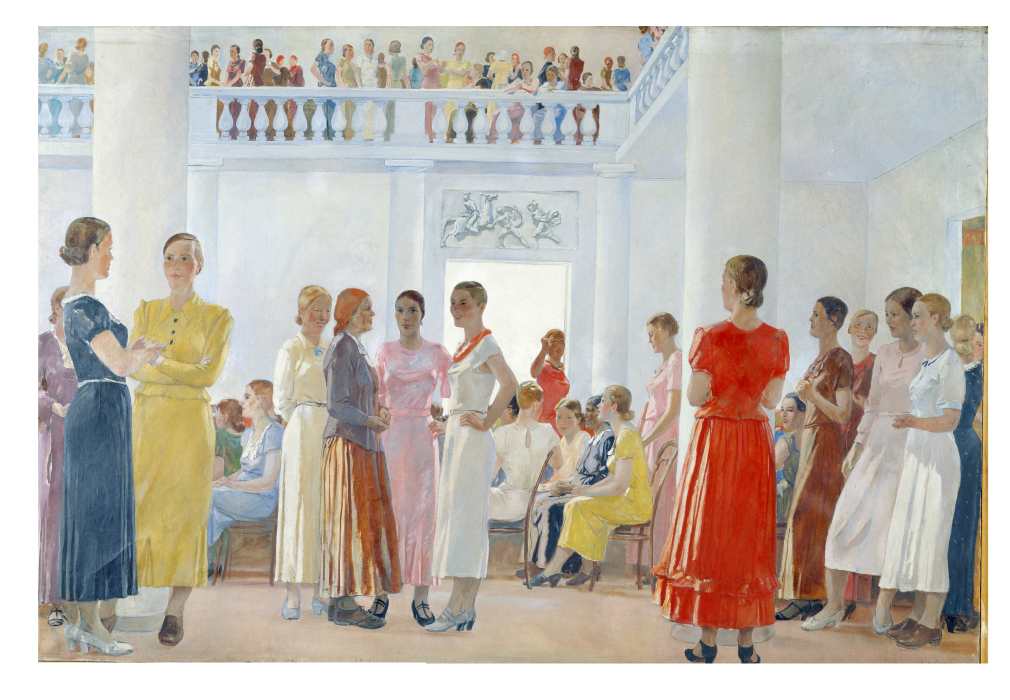Join us for a panel discussion to mark the launch of Christina Kiaer’s new book Collective Body: Aleksandr Deineka at the Limit of Socialist Realism (University of Chicago Press, 2024), which offers a new account of Socialist Realism not as a totalitarian style but as a fiercely collective art system. Christina Kiaer is joined by Maria Mileeva, Michał Murawski, Alex Potts and Sarah Wilson.
Dislodging the avant-garde from its central position in the narrative of Soviet art, Collective Body presents painter Aleksandr Deineka’s corporeal version of Socialist Realism as an alternate experimental aesthetic that activates affective forces for collective ends.
Christina Kiaer traces Deineka’s path from his avant-garde origins as the inventor of the proletarian body in illustrations for mass magazines after the revolution through his success as a state-sponsored painter of monumental, lyrical canvases during the Terror and beyond. Deineka figures in this study not as a singular master, in the spirit of a traditional monograph, but as a limit case of the system he inhabited and helped to create.
Collective Body shows how the art of the October Revolution continues to capture viewers’ imaginations by evoking the elation of collectivity, retaining the potential to inform the art-into-life experiments of contemporary art.
The event is organised by Maria Mileeva, Lecturer at The Courtauld, in collaboration with the FRINGE Centre for the Study of Social and Cultural Complexity (UCL) and PPV (Perverting the Power Vertical: Politics and Aesthetics).
Speakers
Christina Kiaer is the Frances Hooper Professor in the Arts and Humanities and Chair of the Department of Art History at Northwestern University and the author of Imagine No Possessions: The Socialist Objects of Russian Constructivism (MIT, 2005); co-author with Robert Bird and Zachary Cahill of Revolution Every Day: A Calendar (Mousse, 2017); and co-editor with Eric Naiman of Everyday Life in Early Soviet Russia: Taking the Revolution Inside (Indiana, 2005). She is curating the exhibition Collective Threads: Anna Andreeva at the Red Rose Silk Factory, opening at the Museum of Modern Art-Costakis Collection in Thessaloniki in December 2024.
Maria Mileeva is a Lecturer at The Courtauld Institute of Art, London. Her research and teaching centre around postcolonial and decolonial narratives of the Russo-Soviet imperial projects and Soviet multinationalism. Maria’s current book project interrogates the linkages between the cultural policies of socialist realism and socialist internationalism in the postwar period. An aspect of this research was published as “Imagined Solidarities: Cairo-Moscow and the Struggle for Realist Art”, in a special issue of Art History entitled “Red Networks: Postwar Art Exchange”, ed. Vivian Li, 45:5 (Nov 2022). Maria is the co-convenor of PPV (Perverting the Power Vertical: Politics and Aesthetics), UCL.
Michał Murawski is an anthropologist of architecture and cities. He is Associate Professor of Critical Area Studies at the School of Slavonic and East European Studies, University College London. His is the author of The Palace Complex: A Stalinist Skyscraper, Capitalist Warsaw and a City Transfixed (Indiana, 2019) and recolonial russia: architecture & ecology, violence & artifice in putin’s paradise (MIT, 2025); editor of A Form of Friendship: The Museum on the Square (Chicago, 2024); and co-editor of Anti-Atlas: Critical Area Studies from the East of the West (with Wendy Bracewell and Tim Beasley-Murray, UCL Press, 2024) and Re-Centring the City: Global Mutations of Socialist Modernity (with Jonathan Bach, UCL Press, 2020). He is Director of the FRINGE Centre for the Study of Social and Cultural Complexity; and convenor of PPV (Perverting the Power Vertical: Politics and Aesthetics), a seminar and events platform based at UCL.
Alex Potts is author of Flesh and the Ideal. Winckelmann and the Origins of Art History (1994 and 2000), The Sculptural Imagination. Figurative, Modernist, Minimalist (2000), and most recently Experiments in Modern Realism: World Making, Politics and the Everyday in Postwar European and American Art (2013). He was co-editor of Modern Sculpture Reader (2007/2012). Currently he is writing a book on labour and the depiction of the social in later nineteenth-century art. He taught at the University of Michigan, Ann Arbor where he was Max Loehr Collegiate Professor in the History of Art.
Sarah Wilson is Professor of Modern and Contemporary Art at The Courtauld. She first visited the USSR in 1981 in the wake of the Paris-Moscow exhibition exchanges, 1979-80. She is a specialist in Franco-Soviet relations and published Picasso, Marx and Socialist Realism in France in 2013. With Boris Groys, she generated the MA ‘Global Conceptualism, the last avant-garde or a new beginning?’; (five PhDs and thirteen MAs supervised on Soviet and post-Soviet art). She has published on the contemporary artists Oleg Kulik, Alexander Ponomarev, Semyon Faibisovich and Nadia Khodassievitch-Léger. She was principal curator for Paris, Capital of the Arts, 1900–1968 at the Royal Academy, London, and Guggenheim Bilbao, and Pierre Klossowski and the Vicious Circle, Whitechapel Art Gallery, London, 2009, travelling to Cologne and Paris. In 2015 she was appointed curator for the 1st Asian Biennial/ 5th Guangzhou Biennale and awarded the annual prize by the International Association of Art Critics. She is currently writing the sequel to The Visual World of French Theory (2010, 2018) focussing on abstract, textile and performance artists in Paris.







